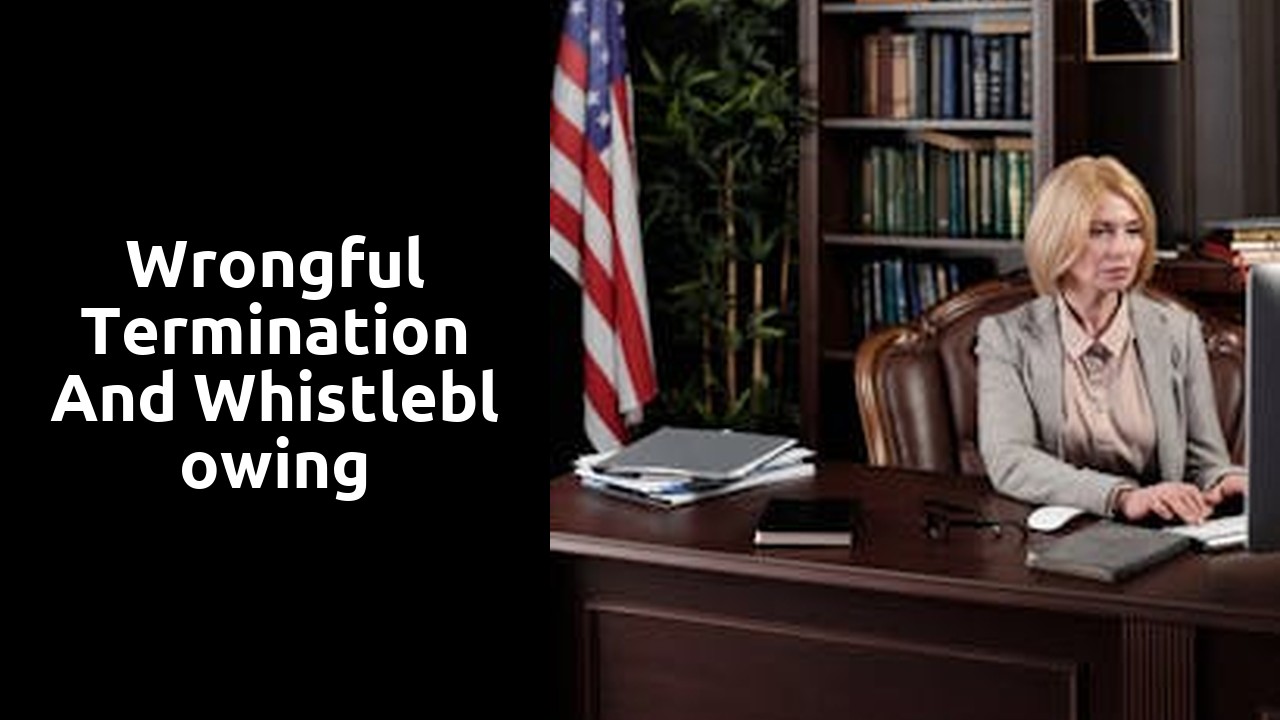Wrongful Termination and Whistleblowing

Unjust Dismissal: When Employees Speak Out
When employees find themselves in a situation where they witness wrongdoing or unethical behavior within their organization, it is both their right and responsibility to speak out. However, doing so can often come at a high cost. Many brave individuals who choose to shed light on the truth, combating unfair employment practices, face the threat of unjust dismissal.
Unjust dismissal occurs when an employee is terminated from their position purely as a result of speaking out against workplace injustices. This can include reporting instances of harassment, discrimination, fraud, or any other form of misconduct. In some cases, employers may attempt to silence whistleblowers by using their power to retaliate, leaving the employee vulnerable in a professional and personal sense. This not only creates an atmosphere of fear and intimidation within the workplace, but it also perpetuates a system that enables injustice to persist.
Uncovering the Truth: Challenging Unfair Employment Practices
Workers across various industries continue to face the harsh reality of unfair employment practices. From being denied deserved promotions to experiencing discrimination, employees have often been left with no choice but to suffer in silence. However, a wave of change is slowly emerging as individuals are stepping up to challenge these unethical behaviors and uncover the truth. Through their courage and determination, these whistleblowers are shedding light on the dark corners of the corporate world and forcing organizations to be held accountable for their actions.
Uncovering the truth and challenging unfair employment practices requires immense bravery, as individuals risk their careers and personal wellbeing when they speak out against their employers. Yet, these courageous individuals feel compelled to expose the injustice they witness, driven by a belief in fairness and equality. By bringing forward their experiences and unveiling the hidden truths, whistleblowers are not only seeking justice for themselves but also paving the way for a more transparent and equitable workplace for all.
Standing Up for What's Right: Navigating Workplace Injustice
Navigating workplace injustice can be a daunting task, but standing up for what's right is crucial in ensuring a fair and equitable workplace for all. Employees may find themselves facing various forms of injustice, such as discrimination, harassment, or unfair treatment. It takes courage and determination to challenge these unfair employment practices, but the benefits of speaking out can have far-reaching effects not just for the individual but for the entire organization.
One important aspect of navigating workplace injustice is understanding one's rights and protections under the law. Familiarizing oneself with relevant labor laws and employment regulations can provide the necessary knowledge and confidence to address workplace wrongdoings. Seeking legal advice or consulting with an employment lawyer can be instrumental in navigating the often complex legal landscape, as they can help individuals understand their rights, provide guidance on the best course of action, and advocate on their behalf if necessary.
Employment Challenges: Breaking the Silence
In the realm of employment, challenges often arise that push individuals to their limits. In some cases, those challenges are not simply confined to the tasks at hand or the demands of a job description. Rather, individuals may find themselves facing issues related to unethical or unfair practices within their workplace. These challenges, while daunting, can serve as an opportunity for individuals to stand up for what is right and break the silence that often perpetuates such injustices.
One of the primary barriers to breaking the silence surrounding employment challenges is fear. Fear of retaliation, fear of losing one's job or reputation, and fear of the unknown can all contribute to the silence that allows these issues to persist. However, it is crucial to recognize that silence only perpetuates the problem, ultimately allowing it to thrive and impact not only the individual but potentially the wider workforce. It is in speaking out, despite the fear, that individuals can begin to challenge the status quo and address the injustices that they witness or experience firsthand.
Speaking Up for Justice: Addressing Workplace Wrongdoings
Workplace wrongdoings can come in various forms, from harassment and discrimination to unethical practices and safety violations. In many cases, employees are aware of these injustices but hesitate to speak up due to fear of retaliation or disbelief that their voice will make a difference. However, addressing these wrongdoings is crucial for ensuring a fair and safe work environment for all.
Speaking up for justice in the workplace requires courage and resilience. It means taking a stand against harmful behaviors and challenging the status quo. It involves voicing concerns and raising awareness about the injustices occurring within an organization. By speaking up, employees can make a difference, shed light on the truth, and hold those responsible accountable for their actions. Addressing workplace wrongdoings is not only about seeking justice for oneself but also for the collective well-being of the entire workforce.
Exposing Injustice: The Role of Whistleblowers in Corporate Culture
Whistleblowers play a crucial role in exposing injustices within corporate culture. When an employee witnesses unethical behavior, misconduct, or wrongdoing, speaking out can be an act of bravery and moral responsibility. By shedding light on these issues, whistleblowers serve as catalysts for change and accountability.
However, the decision to blow the whistle is not without consequences. In many cases, whistleblowers face retaliation, discrimination, and even termination for their actions. This creates a challenging and often hostile environment for those who choose to speak up. Despite the risks, whistleblowers continue to step forward, driven by a commitment to integrity and a belief in the power of exposing corporate injustices.
Related Links
Wrongful Termination and RetaliationRemedies Available for Wrongful Termination
Steps to File a Wrongful Termination Lawsuit
Wrongful Termination and Discrimination
Employer Defenses in Wrongful Termination Lawsuits
Statute of Limitations for Wrongful Termination Cases
Proving Wrongful Termination in Employment Law
Common Types of Wrongful Termination Claims